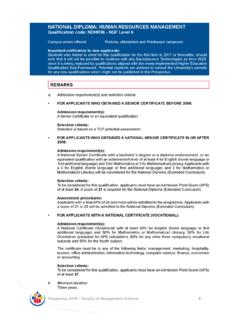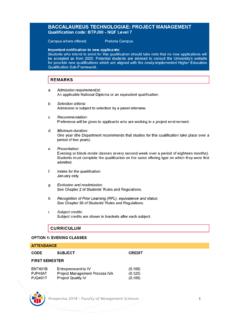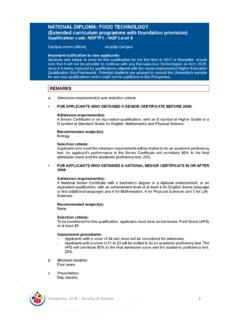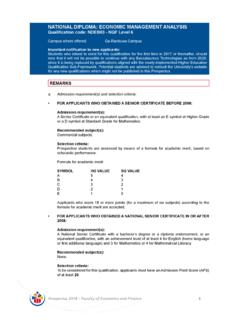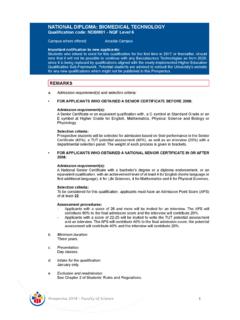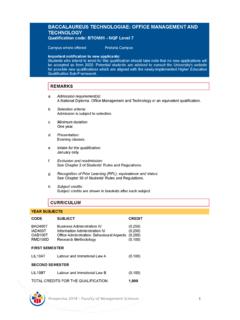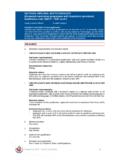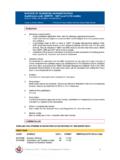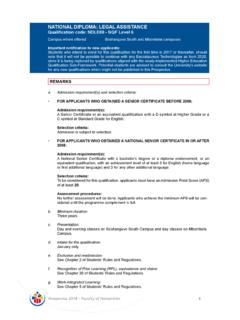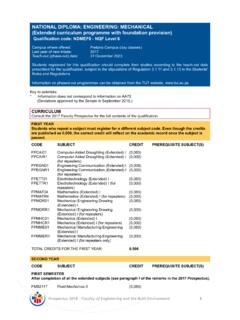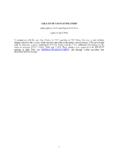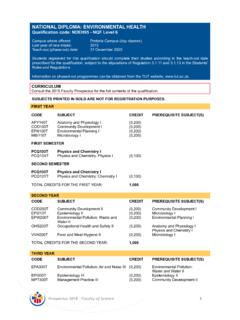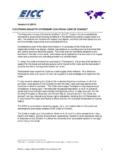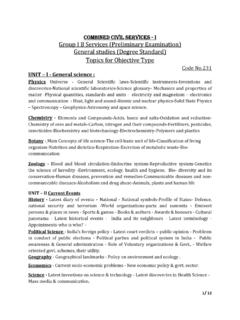Transcription of BACHELOR OF ENVIRONMENTAL HEALTH
1 BACHELOR OF ENVIRONMENTAL HEALTH . (Qualification type: Professional BACHELOR 's Degree). Qualification code : BPEH01 - NQF Level 8 (499 credits). SAQA ID: 93858, CHE NUMBER: H/H16/E018 CAN. Campus where offered: Pretoria Campus REMARKS. a. Admission requirement(s) and selection criteria: FOR APPLICANTS WHO OBTAINED A SENIOR CERTIFICATE BEFORE 2008: Admission requirement(s): A Senior Certificate or an equivalent qualification with a D symbol at Higher Grade for English, Biology, Mathematics and Physical Science. Recommended subject(s): Geography and Agricultural Science. Selection criteria: Selection is done in accordance with the HEALTH Professional Council of South Africa (HPCSA).
2 Students are assessed by means of a formula for academic merit, based on scholastic performance. Formula for academic merit: SYMBOL HG. A 5. B 4. C 3. D 2. i. The subjects Biology, English, Mathematics and Physical Science will be used to assess the application. ii. One (1) additional point will be added if the applicant has passed Agricultural Science and/or Geography. iii. Applicants who score eight (8) or more points according to the formula for academic merit will be accepted. FOR APPLICANTS WHO OBTAINED A NATIONAL SENIOR CERTIFICATE IN OR AFTER. 2008: Admission requirement(s): A National Senior Certificate with a BACHELOR 's degree endorsement (four subjects with a mini- mum score of 4 in each) or equivalent recognised qualification, with an achievement level of at least 4 for English (home language or first additional language), 4 for Mathematics, 4 for Physical Sciences, 4 for Life Sciences and 4 for two other subjects (excluding Life Orientation).
3 Recommended subject(s): None. Selection criteria: To be considered for this qualification, applicants must have an Admission Point Score (APS). of at least 24. Assessment procedures: No further assessments will be done. Applicants who receive the minimum APS will be con- sidered for placement subject to availability of space. Prospectus 2018 - Faculty of Science 1. FOR APPLICANTS WHO OBTAINED A QUALIFICATION FROM TECHNICAL AND. VOCATIONAL EDUCATION AND TRAINING (TVET) COLLEGES (PREVIOUSLY. KNOWN AS FET COLLEGES): Admission requirement(s): A National Certificate (Vocational) at NQF Level 4 with a BACHELOR 's degree endorsement issued by the Council for Quality Assurance in General and Further Education and Training (Umalusi), with at least 50% (APS of 4) for English, Mathematics, Physical Sciences and Life Sciences and any two other additional vocational subjects.
4 A candidate may have a score of less than 4 for each of the additional subjects provided that the final APS is at least 24. Selection criteria: To be considered for this qualification, applicants must have an Admission Point Score (APS). of at least 24. b. Minimum duration: Four years. c. Presentation: Day classes. This programme consists of formal tuition and Work-Integrated Learning. d. Intake for the qualification: January only. e. Exclusion and readmission: See Chapter 2 of Students' Rules and Regulations. f. Recognition of Prior Learning (RPL), equivalence and status: See Chapter 30 of Students' Rules and Regulations. g. Professional registration Compulsory, once-off, students have to register in the first year with the HEALTH Professions Council of South Africa (HPCSA).
5 HPCSA requires students to complete community service for a period of one year on successful completion of this qualification. h. Special rules and regulations: Unless otherwise stipulated, special rules and regulations, as published in the programme guide, apply to students who register for this qualification. Students should familiarise themselves with those rules and regulations. Students will handle carcasses, body parts, entrails and fluids of slaughtered animals referred to in the Meat Safety Act, 2000 (Act No. 40 of 2000). and its regulations during abattoir and laboratory practical. Students undergo work-integrated learning and take study tours. They have to purchase protective clothing for the module, Food and Meat Hygiene.
6 I. Module credits: Module credits are shown in brackets after each subject. CURRICULUM. FIRST YEAR. code MODULE NQF-L CREDIT PREREQUISITE MODULE(S). AAP105P Anatomy and Physiology I (5) (17). CHE105P Chemistry I (5) (15). IEV105P Introduction to ENVIRONMENTAL (5) (20). HEALTH I MIB105P Microbiology I (5) (15) PHY105P Physics I (5) (20). SOC105P Sociology I (5) (17). Prospectus 2018 - Faculty of Science 2. FIRST SEMESTER. CAP115P Communication for Academic (5) (8). Purposes I. SECOND SEMESTER. ITC125P Computer Literacy I (5) (8). TOTAL CREDITS FOR THE FIRST YEAR: 120. SECOND YEAR. code MODULE NQF-L CREDIT PREREQUISITE MODULE(S). CDV206P Community Development II (6) (15) Sociology I.
7 EPL206P ENVIRONMENTAL Pollution: Waste, (6) (15) Anatomy and Physiology I. Water and Air II FMH206P Food and Meat Hygiene II (6) (21) Microbiology I. IDE206P Infectious Disease Epidemiology II (6) (18) Microbiology I. OHS206P Occupational HEALTH and Safety (6) (20) Anatomy and Physiology I. (Physical) II Physics I. PBE206P Planning for Built Environment II (6) (15) Introduction to ENVIRONMENTAL HEALTH I. FIRST SEMESTER. COP216P Communication for Occupational (6) (8). Purposes II SECOND SEMESTER. REM126P Research Methodology I (6) (10) Introduction to ENVIRONMENTAL HEALTH I. TOTAL CREDITS FOR THE SECOND YEAR: 122. THIRD YEAR. code MODULE NQF-L CREDIT PREREQUISITE MODULE(S).
8 EEM307P ENVIRONMENTAL Epidemiology III (7) (17) Infectious Disease Epidemiology II. EHM307P ENVIRONMENTAL HEALTH Management (7) (20) Community Development II. and Administration III. FPS307P Food Processing and Safety III (7) (22) Food and Meat Hygiene II. OHS307P Occupational HEALTH and Safety (7) (22) Occupational HEALTH and Safety (Chemical and Biological) III (Physical) II WQW307P Water Quality and Waste Water (7) (15) ENVIRONMENTAL Pollution: Waste, Management III Water and Air II. FIRST SEMESTER. RMB217P Research Methodology and (7) (14) Research Methodology I Biostatistics II. TOTAL CREDITS FOR THE THIRD YEAR: 110. Prospectus 2018 - Faculty of Science 3.
9 FOURTH YEAR. code MODULE NQF-L CREDIT PREREQUISITE MODULE(S). AQM408P Air Quality Management IV (8) (15) DMA408P Disaster Management IV (8) (16) FSM408P Food Safety Management IV (8) (15) Food Processing and Safety III. MAP408P Management Practice IV (8) (15) ENVIRONMENTAL HEALTH Management and Administration III OHS408P Occupational HEALTH and (8) (20) Occupational HEALTH and Safety Safety Management IV (Chemical and Biological) III WMA408P Waste Management IV (8) (21) Water Quality and Waste Water Management III. FIRST SEMESTER. REP408P Research Project IV (8) (25) Research Methodology and Biostatics II. SECOND SEMESTER. EMA428P ENVIRONMENTAL Management IV (8) (20).
10 TOTAL CREDITS FOR THE FOURTH YEAR: 147. TOTAL CREDITS FOR THE QUALIFICATION: 499. SUBJECT/MODULE INFORMATION (OVERVIEW OF SYLLABUS). The syllabus content is subject to change to accommodate industry changes. Please note that a more detailed syllabus is available at the Department or in the study guide that is applicable to a particular subject/module. On 01 August 2017, the syllabus content was defined as follows: A. AIR QUALITY MANAGEMENT IV (AQM408P) 1 X 3-HOUR PAPER. (Module custodian: Department of ENVIRONMENTAL HEALTH ). Air pollution sources and related emissions of the respective priority industrial processes; respective available options to control air pollution; air pollution measurement equipment/ techniques and apply the respective sampling techniques; global warming consequences, strategies and mitigation measures; measurement, in- terpretation and prescribing of controls and reporting on ENVIRONMENTAL noise impacts; ENVIRONMENTAL radiation sources and HEALTH effects of radiation and radioactivity.
